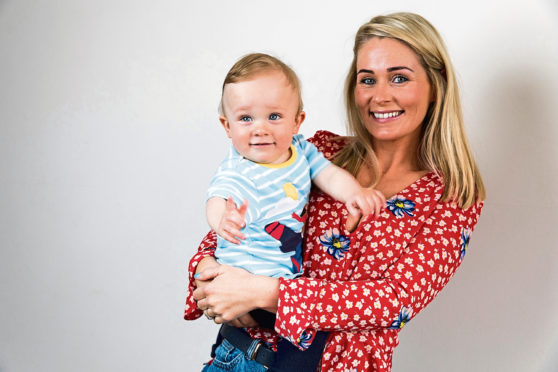
Lucy’s first pregnancy was progressing smoothly.
She and her husband Kyle had every reason to feel happy and confident as they prepared to welcome their baby.
So when Lucy went into spontaneous labour 10 weeks too soon just over a year ago, the shock was immense.
Now living in Gourock, in the west of Scotland, Lucy and Kyle were based in New Zealand at the time, far from Lucy’s family.
As an airline pilot, Kyle travels away a lot but thankfully he was home on the evening when, 30 weeks into her pregnancy, Lucy started to feel uncomfortable.
At first, she thought it was just indigestion but, realising the sensation was coming in waves, she called the hospital just to be on the safe side.
“It had been a really easy pregnancy but as a first-time mum, I had no idea what labour felt like, no idea what to expect. We hadn’t even finished antenatal classes,” Lucy says.
“I wasn’t seen straight away.
“By the time they examined me I was 4cm dilated. An hour later, I was 7cm. They gave me drugs to try to delay labour but they didn’t work.
“When they told me I’d be giving birth that night, at first I felt overwhelmed and then excited – they told us that 30-week babies usually do really well.”
Just 12 hours later, baby Luka was delivered weighing 3lbs 9oz and was immediately taken to the Neonatal Intensive Care Unit (NICU).
“I felt OK at the start and so did Kyle – we just assumed everything was going to be all right. We thought Luka would eat, grow and be home in a few weeks.”
Lucy was discharged after one night and she and Kyle spent as much time as possible with their new baby son, visiting every morning and evening.
“On day five Luke became very ill. It was the worst day of my life,” Lucy says.
Luka had become sick and his tummy was distended. Doctors knew there was an infection but blood tests did not reveal the type or location.
“We were told it could be meningitis or necrotising enterocolitis,” Lucy says.
Little Luka was given a range of antibiotics. He was ventilated and given morphine and, thankfully, started to recover.
Less than a week old, and still extremely small and vulnerable, Luka stayed in the NICU where he could receive round-the-clock care.
Lucy and Kyle started to relax but three weeks later they got a phone call at 4am. Luka had been very sick, his tummy was extended and doctors felt they must operate straight away to find out what was wrong.
The surgeon suspected a twisted gut or infection but reassured Lucy and Kyle that babies born at 30 weeks are far less vulnerable than those born even earlier.
Lucy says: “He was anaemic and had a blood transfusion. I knew it was serious but the thought that Luka could die never really crossed my mind.”
Waiting for three hours while their tiny son endured surgery was an experience Lucy will never forget.
When Luka’s surgeon called the news was very distressing. They had detected necrotising enterocolitis (NEC), removed 10cm of Luka’s bowel and formed a stoma to take care of his body’s waste.
However, the medical team was confident that Luka would make a good recovery.
“From that day, Luka did get better,” Lucy says. “We learned stoma care so we could take Luka home.”
Although desperate to have their baby son at home, it was a stressful time for the new parents as Luka did not gain weight, and the prospect of further surgery to reverse his stoma lay ahead.
“The second surgery was actually harder for us to cope with because we’d become so used to having Luka at home,” Lucy reflects.
Thankfully, after just a couple of days Luka was able to leave hospital and from that point on has come on in leaps and bounds.
Now 12 months old, his proud mum says: “Luka is the most clever, funny and energetic baby ever! His favourite thing is swimming and he loves his bath.
“He also loves his food. There was always this worry, given the NEC, but he eats everything and that makes me so happy.”
Lucy and Kyle got involved with Action Medical Research which is funding a study into the protective properties of breastmilk in relation to NEC and sepsis.
“Luka’s surgeon advised me to breastfeed him after surgery. It’s a big part of why I’m interested in this research,” Lucy says.
“Premature birth can happen to anyone but there’s just not enough research.
“When Luka was in hospital there were just so many mums who never got an answer. It does make me afraid to become pregnant again.”
Action Medical Research is a leading UK-wide charity saving and changing children’s lives through medical research. They have launched an appeal to raise funds for research into NEC. For more information visit www.action.org.uk/fightNEC


Enjoy the convenience of having The Sunday Post delivered as a digital ePaper straight to your smartphone, tablet or computer.
Subscribe for only £5.49 a month and enjoy all the benefits of the printed paper as a digital replica.
Subscribe